Semester at Sea alumni had the opportunity during the Forum on Global Engagement to give their perspective on Sino-U.S. relations. But, true to the academic experience of Semester at Sea, this was no ordinary discussion. Instead, four students from the Spring 2010 voyage got together to talk about their experience on that voyage and what they learned about China and the U.S. and themselves.
The Spring 2010 voyage marked the launch of the C.Y. Tung Program in Sino-U.S. relations. The program is named in honor of C.Y. Tung, who was instrumental in the founding of Semester at Sea. The inaugural program was led by faculty from Fudan University in Shanghai and U.S. faculty members, and included rigorous courses on Chinese and U.S. relations, history, culture, economics and diplomacy.
Ten U.S. students and Chinese students received grants as C.Y. Tung Scholars to study aboard the MV Explorer and travel the world together. The students enrolled in the ‘Sino-U.S. Relations’ class, taught by a team of three teachers from China and the U.S. The students also had the privilege while in China to meet C.H. Tung, son of C.Y. Tung, together with their academic dean Loren Crabtree, former chancellor of the University of Tennessee.
The semester-long class opened the eyes of all students ‚Äì American and Chinese ‚Äì about the similarities, differences, and cultural nuances of each other’s country. It challenged their beliefs about what it means to be Chinese or American.
Four students – two from the U.S. and two from China – reunited with Dean Crabtree during the Forum on Global Engagement to discuss U.S.-Sino relations from their point of view and to describe what they took from their semester together.

The students were: Yilong (Max) Chen, a 2010 graduate of Fudan University; Qi (Lucy) Lu, a senior at Fudan University, majoring in history and law; Matthew Parisi, a 2011 graduate of Penn State University; and Oliver Wolfe, a 2011 graduate of Vanderbilt University.
Here are excerpts from their conversation:
Why they joined Semester at Sea and signed up for the course
Matthew Parisi went on Semester at Sea to see the world. What he got out of his Spring 2010 voyage was a sense of community, not only aboard the MV Explorer, but also seeing and being a part of it in the countries he visited. Said Matthew: “I took a class with three professors that was better than any other class I’ve taken at Penn State.”
Oliver Wolfe said he knew that he didn’t want to settle in one country for a semester, but instead wanted to see and experience lots of countries. He took the Sino-U.S. course because a friend of his who attends Yale highly recommended one of the three professors, Wolfe said he was familiar with Shen Dingli from news articles about China, in which Shen is widely quoted, and Wolfe knew that [UVa professor] John Israel is an expert on China. “So I thought I couldn’t go wrong taking this course. And I’m glad I decided to take it.”
What did they learn about the differences and similarities between the U.S. and China from the course
“There is a saying in China that two tigers cannot live on the same mountain together peacefully. I am curious to see how China and the U.S. can live together peacefully on this earth.”
, Qi Lu
“When we talk about the differences between our two countries we focus on the basics, but there is so much more to it than that. It’s the small things that make us different and that make us similar.”
, Yilong Chen
“In class we had an exercise where the student were divided into four groups of their choosing: mainland China, international society, U.S., Taiwan society. Many of the lifelong learners chose mainland China. The girls mostly chose international society. I and some other students chose Taiwanese society. And many of the U.S. boys they stayed in their own country. The exercise really gave me a chance to see how people view themselves and relate to other countries. For example, I think maybe the lifelong learners saw more similarities in this point in their lives with China or more were

more sympathetic with the lives of the Chinese. Maybe, the women chose international society because they were more interested in a peaceful life than focused on war. ‚Ķ.This course gave me ideas about demographics of people in both country and what we can do to make our relationships better.”
, Qi Lu
Asked about the importance (or even need for) history. “Is history worth it?”
“History is very important, but I think we need a new way to look at history to focus on peace and stability instead of the focus on conflict and wars that we read in the history books.”
, Qi Lu
“If we go abroad we must take our baggage, but it has to be enough for us to carry for ourselves and not to heavy that we have to lug it behind. ‚ĶFor me, history is like taking our baggage. We have to have enough to move forward, but not so much that we are weighed down and cannot move and make steps to change.”
, Yilong Chen
Asked about the impact Semester at Sea and the course has had on them
The Sino-U.S. course and Matthew Parisi‘s visit to China taught him a lot about tolerance and acceptance of change. The class really opened his eyes to the relationships between the U.S. and China. When he went to Tiananmen Square during his time in Beijing he asked a woman there what she thought of the Tiananmen Square massacre and she said that they referred to it as the ‘June 4th event’. Then she put her hand over Matthew’s mouth and said ‘We don’t talk about those things here.’ “So it made me think that maybe Chinese people aren’t as tolerant of social change as they’d like us to think,” Matthew surmised.
Asked whether the SAS experience of several countries is not true immersion versus studying in one country for a semester
“Semester at Sea makes you want to go back to those countries that you’ve visited. The urge to go back and explore more and learn more is what I will take away from Semester at Sea. More so, now when I see Ghana in the news I’ll read every article about the country where before I wouldn’t have glanced at it.”
, Oliver Wolfe
How SAS compares to programs where students are immersed in one culture and one place for a semester
“In my view going on Semester at Sea is the immersion in the phenomenon that is globalization. Semester at Sea does immerse students in that way. There’s a lot of interchange that goes on around the ship and that’s the special part of the shipboard community. We had students from 12 different countries studying aboard our ship during our Spring 2010 voyage. The students visit up to 12 different countries and learn about them before, during and after their time there. ‚Ķ They create a lifetime of opportunities where the students are taught how to live, to learn and to lead. There’s nothing quite like living with students like this, in this learning environment for 106 days.”
, Loren Crabtree


